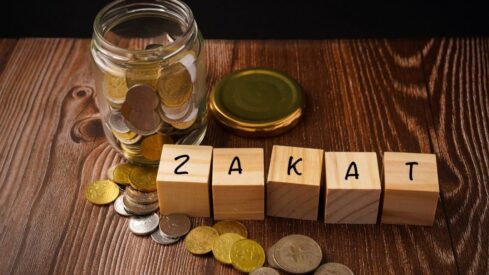Zakah is a portion of one’s wealth that must be given to the poor or to other specified causes. The word “zakah” comes from the verb meaning to purify or cleanse. It is the third Pillar of Islam and is obligatory for all those who are financially able. Zakah means the giving of a specific share of one’s wealth and savings to persons or causes that Allah (God) mentions in the Qur’an. The normal share to be paid is two and a half percent of one’s saved earnings. This applies to cash, bank savings and jewelry. The rate for cattle and agricultural produce is different.
The Qur’an mentions zakah, together with salah (ritual Prayer), as a form of worship; and in that respect it differs from ordinary charity, which is optional, and from tax, which a government imposes from time to time at variable rates and for various uses. The money from zakah can be used only for specific purposes under fixed headings – like helping the poor, the needy, to pay the salaries of those collecting it, to free captives and debtors, for travelers in need, to win over hearts and for the cause of Allah (God) (Qur’an 9: 60)
The payment of zakah is a way of purifying one’s wealth. It saves one from greed and selfishness and encourages him to be truthful and God-fearing in his financial dealings. Another purpose is to help the poor and the needy and to assist other causes in the way of Allah (God). Muslims know that it is a profitable investment (and not a loss) to help the cause of Allah (God) because it will establish economic balance and social justice, and at the same time earn an immense reward in the Hereafter.
From the Islamic point of view, wealth belongs to Allah (God) and is held by human beings in trust; so a person has no right to use it to satisfy his whims. He has to observe the Divine commandments here, as elsewhere. For those whom Allah has blessed with wealth, it is a test; and Muslims should strive to pass this test by not becoming worshipers of hoarded wealth. They should rather use the wealth only in ways Allah (God) has permitted and realize that the amount of zakah to be given is not really their money but, rather, it belongs to those who have less than they do.
Zakah is one of those unique forms of worship that bring out bo th the individual and the social aspects of `ibadah (worship). Consider its socio-political value: It frees society from the ill feelings arising out of class hatred. It opposes an individualism that is blind to the travails of one’s neighbors and stands against a socialism that shackles individual freedom. It fosters neither selfishness nor renunciation. It also strengthens a sense of brotherhood and establishes social cohesion.
The resources liable for zakah in general terms are the balance remaining after meeting expenses. This means that at the end of a year (calendar year or fiscal year) a Muslim has to calculate what amount must be paid for zakah. There are various rules for individuals, farms, factories and businesses.
















